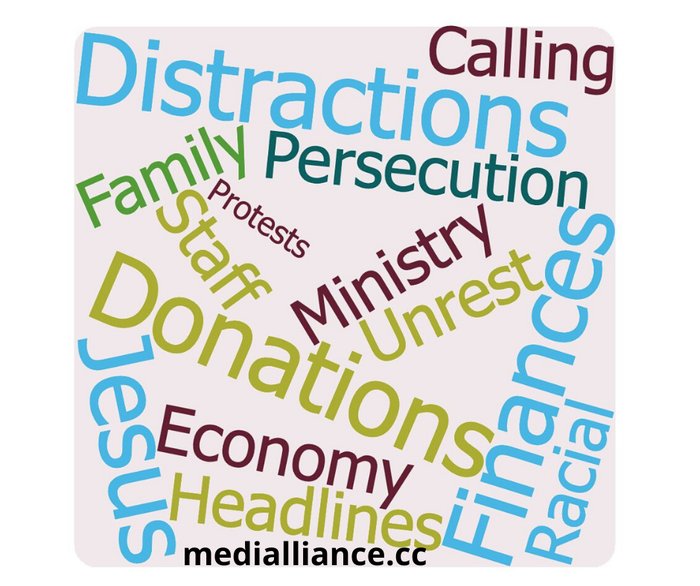His words stunned the group
A group of Christian broadcasters were meeting to discuss how to be more effective in their radio ministries. The group was made up of station managers, program directors and other key leaders of substantial ministries known for proclaiming the Lord’s Truth to our culture. They had been in workshops and heard from colleagues on how to run effective radio ministries.
But one session was different. The speaker was not a broadcaster, but a wise man of God known for revealing spiritual insight in sometimes startling ways. Yet the group was not prepared for his message that day.
Dr. Henry Blackaby, my friend and mentor, stood before these broadcasters and Christian communicators and asked this probing question:
“Are you content to let someone else go into God’s presence and then just tell you what the Lord said?”
The room became very quiet. Blackaby drew upon a passage in Deuteronomy 5 as Moses recounted his experience with God. After reminding the children of Israel of the Lord’s commandments and admonitions, the Israelites responded this way:
Go yourself [Moses] and listen to what the Lord our God says. Then come and tell us everything he tells you, and we will listen and obey. Deuteronomy 5:27 NLT
At one time those wandering Israelites heard the voice of Almighty God speaking from the mountain. Yet they were more concerned for themselves than for what the Lord might say to them. In fact, they were afraid of what might happen if they heard directly from God.
What about you? What if you had been in that room and heard Blackaby pose that question? How would you have responded?
We in Christian broadcasting play programs from great teachers and preachers and play music that has powerful and biblical messages. Are we content to let this be the source of our “word from the Lord?” Do we have an overwhelming desire to hear directly from God on critical matters in our lives and in our culture today? Or are we okay with catching a reflection of the Lord’s words through another?
I’ve recognized for many years as I have taught and led others in Christian media that, if we aren’t careful, we will depend on the mechanics of good production and good broadcasting and completely miss what God wants us to do. I have sometimes said we can be so professional in our organizations that Christ could take His hand off our ministries and we would go right on being “successful.”
To paraphrase Jesus’ words in Mathew 16, “What if a man gains the world world...has a successful ministry...and loses his personal encounter with Me?”
God wants to speak to your heart now. Today. As you lead others, those dear souls He has entrusted to you need someone who has been in the Lord’s presence and has heard His Word.
Brother Lawrence, the 17th century French monk, was a humble lay servant. His wisdom formed the basis of the book The Practice of the Presence of God. That life of his, working in the kitchen and repairing the other monk’s sandals, yet spent in the presence of the Lord he loved and served, has had a profound effect on the lives of countless other servants through the centuries. Brother Lawrence had these words of wisdom that still ring true:
“If I were to be responsible for guiding souls, I would urge everyone to be aware of God's constant presence, if for no other reason than His presence is a delight to our souls and spirit.”
The questions I ask you are questions I ask myself. Have you been in God’s presence today? Have you sought to hear from Him personally...through His Word...through prayer...through quietness? Or...are you content to let someone else be in the presence of the Lord and just hear of Him and His direction second-hand? Jesus said it simply.
My sheep listen to my voice; I know them, and they follow me. John 10:27 NLT
By the way...the Lord is actually waiting for that time together. Right now. Really.
The title sold me
The title alone drew me in. Ten Scientifically Proven Ways to be Incredibly Productive by Jeff Haden. Wow. You can’t get much better than that! The article in Inc! magazine sounds promising, right? Well, before you get too excited, I didn’t see any link to scientific studies that would back up the author’s claim. It looks to me like it is someone’s good ideas...but scientifically proven? I don’t see it.
However, as I looked over the list of 10 items suggested, I found a few that seemed to make sense and were worth passing on. So, even without the science to back it up, here are some ideas that may help you be more productive.
One tip was to put fewer things on your To-Do list. And be sure to hit them the first thing in the day. You are fresher then. (Note: I am writing this at 6:45am this morning.) And, you won’t get sidetracked by the other events of the day.
Another thought is to build habits to help you start working. Have that cup of coffee in the morning, but when the coffee is finished, the work begins. Or find some other trigger and use it to launch into the first item on that To-Do list. Does that sound too strict a routine? The author of the article says:
“Routines aren't a sign of boring, regimented people. Routines are a sign of people who have goals and have found the best way--for them--to actually accomplish their goals.”
I’ll lump a couple of the ideas together. Take more breaks and take more naps! (I know...the naps are not always easy in every situation.) Haden takes a cue from Steven Covey’s Seven Habits of Highly Effective People. Covey relates the story of a woodcutter whose saw gets duller as he works. If he would take a break, sharpen his saw, and get back at the work, he would accomplish more in shorter amount of time.
Sometimes we need to refresh our minds and sharpen our saw. Taking a break is more than just standing around the water cooler and chatting with friends. It is time to look away from a task for a moment and get a fresh look at your project. When I was a video editor, I found that I needed to take breaks from the tedious editing process, walk around a bit, and refocus my mind. Then I would come back and look at what I had edited to that point. It was amazing how clearly I saw some problems I had previously overlooked.
Now the part about taking a nap? Again, the author’s words:
"Research shows naps lead to improvement in cognitive function, creative thinking, and memory performance. In particular, napping benefits the learning process by helping you take in and retain information better."
The final idea I will mention is “spend more time in nature.” There is something that refreshes the mind and soul about God’s nature that “...allows your mind to fully relax and unwind and helps you focus longer when you return to work.” Good point. I am writing this sitting on my patio in these early morning hours listening to the birds as they awaken. Refreshing even in the midst of work.
Whether these are “scientifically proven” or not, I think they are good suggestions. Make your list, start your day, take breaks, sharpen your saw, and be refreshed and reminded of all the Lord has created for us to enjoy. And then get after the work. As Timothy wrote:
Work hard so you can present yourself to God and receive his approval. Be a good worker, one who does not need to be ashamed and who correctly explains the word of truth. 2 Timothy 2:15 NLT
Well, time for me to take a break...or maybe a nap.
Stuck? There’s hope!
I once detailed the story to you of getting my Dad’s car stuck in the sand on Judy’s and my honeymoon. Yikes! That was frustrating and a bit frightening. There are stories of people getting stuck in a broken elevator...sometimes for days! I can tell you that it would only take a few hours for me to be overwhelmed inside that elevator box. Others have been stuck in bathrooms or cars. Crazy times that have often had lasting effects on those stuck.
More challenging is the thought of being stuck in a life situation that seems hopeless. A challenging marriage. A difficult ministry. A spiritual dryness that leaves us down, depressed, and...well...feeling stuck.
If you relate to that you are not alone. Many people have been there in their lives and their ministry. Good people. Famous people. Some of God’s choicest servants in His Word went through such experiences. David was in the pit of despair. Stuck in the mud at the bottom of a pit with no clear way out. Elijah saw great victory on Mount Carmel but soon found himself running and hiding. Stuck and depressed. Yep...you are in good company when you feel stuck in life.
Mark Jobe is the President of Moody Bible Institute, taking that role after several decades of leading an inner city church in Chicago. He details his own personal time of being stuck in his book Unstuck: Out of Your Cave, Into Your Call. Jobe was a 21-year-old young man, right out of school, when he accepted the call to this declining church in the midst of a tough area of Chicago.
It was only a few months before he was completely depleted and almost defeated by the magnitude of the job and the lack of anything that resembled success. A doctor told him his health was at risk if he didn’t get some rest and out from under the pressure he felt. That reality only seemed to make things worse for Mark Jobe...but it also led him to a revelation.
After several days of questioning God and wondering why the Lord had brought him to this point, to a dead-end situation, Jobe finally quieted his spirit to the point where God could speak to his heart.
The revelation? In Mark Jobe’s words:
“...I had become too busy with my own mission to make time to listen to God. The voice of people’s needs and my drive to succeed had made me slip away from the most important call, my own walk with God.”
What the Lord revealed to Mark Jobe in those critical days positioned this young pastor to become a great leader, to build a great church, to rescue desperate souls, and to point all to Jesus.
I’ve been there. Maybe you have, too. Trying so hard, for all the right reasons, to be successful in the thing that the Lord has put before you. As a leader, you feel the mandate to lead...and to lead successfully. You read the books, you put in the extra hours, you take the “hits” from employees and volunteers, and even from family and friends. Yet you valiantly soldier on. On your own.
Mark Jobe began to pray, “Forgive me for attempting to do in my own strength what only You can do in the power of Your Spirit.”
Is God whispering to you as you read these words? Does this feeling of being stuck resonate in your heart? Maybe it is time to quiet your heart, shut out the distractions, and remember the words of the Lord through the Psalmist:
Be still, and know that I am God!... Psalm 46:10 NLT
Stuck? You don’t have to stay stuck. There is a way out. A way up.
Problem solving
This Monday MEMO is a bit different. Today, I want you to do something for me. Take out a piece of paper and a writing instrument. I’ll wait for you to find something.
Now...put down the top one or two problems that are keeping you from accomplishing your God-given task. You probably won’t have to think too hard. They are probably before you every day you try to lead and serve. By the way...if you want, you can include problems that keep you from being the person the Lord intends for you to be. Just one or two items.
Now, hold onto that paper while I tell you what God showed me as I was reading through Numbers in the Old Testament. To be honest, some of these passages are rather tedious. Counting men who could fight. Rules and laws for living lives that please the Lord. Sacrifices and gifts to be given to atone for sin and shortcomings. Many of them become repetitive. So, I often ask the Holy Spirit to teach me something through these passages.
I began to think of those Israelites who left Egypt and wandered for 40 years in the wilderness. By many accounts they numbered over two million people. That’s huge. As I figure it, there were probably 400,000 family units throughout the twelve tribes. And God gave Moses instructions for them to make sacrifices.
“...This is the special gift you must present to the Lord as your daily burnt offering. You must offer two one-year-old male lambs with no defects. Sacrifice one lamb in the morning and the other in the evening.” Numbers 28:3-4 NLT
As I read this, each family was to make this sacrifice. If so, four hundred thousand lambs in the morning. Four hundred thousand lambs in the evening. Eight hundred thousand lambs a day. In
five days...four million lambs sacrificed. And this was to go on and on, week after week, month after month, year after year. Where did all these sacrificial lambs come from?
Someone calculated what it would take to feed these two million people. The basic food needed each day was over four million pounds worth. To bring that much food would have taken three trains of boxcars, each over a mile long. And for water...it would have required 11 million gallons each day and a freight train with tanker cars over 1,800 miles long...each day.
Of course, they didn’t have trains!
I could go on and on detailing the magnitude of the challenges these people had and what it would take to meet their needs. Impossible. But...God!
Now...grab that piece of paper you wrote on a few moments ago. Look at the items you wrote down. I’ll wait...
My question to you...how big is that problem of yours?
Over and over throughout the Bible we hear the God saying:
Is anything too hard for the Lord?
The question then is this: Do you trust God or not? Do you believe Him or not? Is He the same yesterday, today, and forever?
The writer of Hebrews has good instructions for us as we trod the often difficult path of life the Lord has for us.
...let us run with endurance the race God has set before us. We do this by keeping our eyes on Jesus, the champion who initiates and perfects our faith. Hebrews 12:1-2 NLT
OK...one more time...look at those things you wrote down. Then look to Jesus and place those problems before Him.
He has been waiting for you.
A string and two cans
Did you ever try the old string and can form of communication? As a kid...probably my Cub Scout days...I punched small holes in two cans (green beans, I think...though it doesn’t matter). Then I threaded a string from the outside bottom of the can through the small hole and tied a knot large enough to not slip back through the hole. I repeated it with the other can. Then with a buddy, we stretched the cans a distance away. One would speak into their can and the other would listen. Then we would reverse the roles. OK...it wasn’t hi-fi or anything...but I could hear him, and he could hear me.
Communication.
Crude, but it worked. You know what the key element was in that process? That person on the other end of the can-string gizmo. Without my buddy...no communication.
That truth, illustrated crudely in my Cub Scout days, stretches from the days of Greek philosopher Aristotle to today. While his teacher and colleague Plato dealt more with content, Aristotle developed a theory of communication that takes into account more than the speaker and the content. Aristotle included the listener...the audience...in his equation, as well as the outcome of the communication. Aristotle’s five points in his theory of communication are these.
• Speaker
• Speech
• Occasion
• Audience
• Effect
This theory can still guide us in the communication process. Out of it flows the principles that we need to know our audience and know what we are wanting them to act upon...the effect of the communication.
I love the Apostle Paul’s speech to the Areopagites in Athens when he was invited to talk about this new “religion.” Paul seized the occasion, understood his audience, and had firmly in mind the goal of his speech to these men. It is found in Acts 17. Paul started...
“Men of Athens, I notice that you are very religious in every way, for as I was walking along I saw your many shrines. And one of your altars had this inscription on it: ‘To an Unknown God.’ This God, whom you worship without knowing, is the one I’m telling you about....” Acts 17:22-23 NLT
Paul had done his homework. Having traveled the great city of Athens he had been distressed by all the statues and the allegiance of the Athenians to all sorts of gods. He used that as an introduction to his speech. He even later quoted a Greek poet to help build a relationship with his audience. But his focus and purpose was to always preach Christ. He cleverly told them the “unknown god” they had built a statue to was the very One Paul wanted to share with them.
Jesus.
That homework on Paul’s part was to keep his audience listening. No audience...no communication. Many of us have stood on Mars Hill looking down into the Agora and across to the Acropolis. I could have stood on the very spot where Paul spoke and could have given my finest speech. But unless there was an audience...another person on the other end of the string...there was no real or effective communication.
When you broadcast, podcast, or speak today, do you know who your audience is? Do you know if they are really tuned into you as you speak? Have you done your homework? Do you say things that relate to their world to help keep them tuned in and catch your message? If not...you may find there is no one on the other end of the string and tin can...and real communication is not happening.
Jesus was a master communicator.
Ken Gosnell leads Christian CEO’s and in an article on Jesus and His example of communication. Gosnell said:
“Jesus always knew His audience. He spoke the right words to the right people with the right tone to deliver the right message.”
So...is anyone on the other end of the string? Do you know who they are? Do you know how to draw them in? Do you have a plan and a purpose for your time speaking to them? Is communication really happening or are you just speaking into a disconnected tin can? How critical is this communication process? Paul summed it up this way:
But how can they call on him to save them unless they believe in him? And how can they believe in him if they have never heard about him? And how can they hear about him unless someone tells them? Romans 10:14 NLT
You have the tools. You have the plan. You have the message. Do you have the heart for others?
Distractons
Distractions...I've had a few...
Singer Frank Sinatra felt that way about “regrets” as he crooned the song “My Way.” Most of us today would feel that regrets have been eclipsed by distractions today. The coronavirus is a global distraction, as well as being a major health and economic concern. Racial unrest in my country and protesters of all kinds draw our attention more that other things. Distractions. Sometimes it is even the daily impact of our ministry and its needs. Distractions.
You may be asking, “Distractions from what?” Glad you asked.
The other morning Judy and I were reading one of the accounts of Jesus’ feeding of the enormous crowds that sometimes packed around Him to hear His teaching. It happened several times...but Jesus gave a brief and stark response to His disciples when they talked to him about the hunger of the crowd.
Late in the afternoon his disciples came to him and said, “This is a remote place, and it’s already getting late. Send the crowds away so they can go to the nearby farms and villages and buy something to eat.” Mark 6:35-36 NLT
Sounds like a reasonable suggestion, right? Except for one thing. The disciples were distracted. Distracted by the need. Distracted by the lack of food for the masses. Distracted by their meager resources. And in verse 37, what was that stark response from Jesus?
...“You feed them.”
Can you put yourself in the place of the disciples? They look out over the hillside at the five thousand men, along with women and children. Probably 10 to 15 thousand hungry folks. And then the disciples did what I probably would have done: weigh the options and the obstacles; try to strategize a way to do what the Master said...and come up short. Jesus’ command to His disciples...“You feed them." The disciples’ response?
“With what?” they asked. “We’d have to work for months to earn enough money to buy food for all these people!” Mark 6:37 NLT
You can almost hear the frustration in their voices. Impossible task. Lacking resources. Yet a clear command from Jesus. I’m thinking there were several awkward seconds that passed as Jesus looked at his key leaders and they looked at Him.
We need to remember that these disciples had seen amazing things happen as Jesus ministered. Their Master had healed the sick, rescued people from demons, calmed the seas...miracle after miracle. But a lack of bread and a large crowd had somehow distracted them from the Lord’s amazing power.
Are you making the application? God has called you to ministry. You have great opportunities. You see the hand of the Lord at work in amazing ways. Then...some obstacle comes up. The need is too great. The resources are too little. The budget is too small. The donations are too few. On and on...distracted by the things we see. And we hear Jesus say, “YOU feed them. YOU do it.” How?
Jesus' plan was simple.
- What DO you have?
- Bring it to me.
“How much bread do you have?” he asked. “Go and find out.” They came back and reported, “We have five loaves of bread and two fish.” Mark 6:38 NLT
Yes, there is a global pandemic. Yes, the global economy is teetering. Yes, we have all sorts of challenges. But Jesus’ direction to the distracted disciples is just as true for us today. What DO you have? Bring it to me.
The few brief words in the opening verses of Hebrews 12 are the key.
“...keeping our eyes on Jesus....”
A. W. Tozer directs us, "If we are to gaze into the face of God, we must look beyond our present circumstances."
I’m sure you know the rest of the story. The people were fed from those meager resources. And as He does again and again, Jesus showed His exceedingly abundant power and love as the disciples brought back more food than they started with. God will make a way...
Distracted? Keep your eyes on Jesus!
Is the long view the wrong view?
My friend Richard Blackaby is trying to lose weight. And part of his plan includes running. I’m not revealing any secrets here. Richard wrote about it the other day. As he explained about the process he was experiencing, he said something that got me thinking. Dr. Blackaby, author of such books as Living Out of the Overflow, and Unlimiting God, set a goal of running in a 10K race. He set a long-term goal. Then he noticed something. He kept getting defeated over and over. The hill before him was too steep. And too long. He got a late start to the day. Many little things deterred him from achieving his goal.
After buying all the right gear...he certainly looked like a runner...he would look down the road too far, and he would be overwhelmed at how distant the goal was. As Blackaby explains...
“I always began my runs with noble intentions. But then I would look at the road ahead. I would see the hill on the horizon, and, inevitably, I’d get psyched out. As I began to ascend the hill, my legs would burn. My heart would race. My head would feel faint, and I’d slow to a walk.”
Are you relating to that? Whether you are a runner or not, we often set lofty goals...good goals...then realize how far away we are from that goal and begin to think of all the obstacles in the way of achieving that goal. Richard Blackaby learned some wisdom in this process. First of all, he learned our minds don’t always do us a favor. “It is amazing how creative your mind can be when it is looking for an excuse not to do what is best!” But there is a more important lesson. Blackaby explains.
“What I have learned is that, sometimes, the long view is a mistake. It involves too many questions and uncertainties.... And, just like that, you’ve talked yourself out of doing something that would have enriched your life and opened new doors of opportunity.”
So, if the long view is sometimes the wrong view, what’s the answer? Keep your vision on the next steps you need to take. Forget the big hill, or how far away the finish line is. Just take the next step...and the next...and the next. In essence, set aside the overall goal, and keep doing the small things that will get you there. Don’t let the long view overwhelm you.
I think of what Paul told the Galatian believers.
So let’s not get tired of doing what is good. At just the right time we will reap a harvest of blessing if we don’t give up. Galatians 6:9 NLT
The long view...the big goal...may discourage you from achieving today what God has for you to accomplish. American preacher Robert Schuller, known for his pithy quotes, often said, “Inch by inch everything’s a cinch.”
Is there ever a time to take a long view? Of course. It is those lofty goals and plans that inspire. Urban planner Daniel Burnham is quoted as leading Chicago in the late 1800s with these words:
“Make no little plans; they have no magic to stir men's blood.... Make big plans; aim high in hope and work....”
However, in the day-to-day struggles toward those big plans, keep striving for that next step...and the next. The goal will soon be realized. The accomplishment will bring satisfaction. Others will be inspired. And, as God’s servant, you will be on your way to bringing more glory to the Lord through your life.
Were the good old days really good?
Some friends at a broadcast ministry where I served over 15 years ago were texting about the adventures and memories of those times. And the phrase came up. Those were the “good old days.” I had to answer them. “No...those weren’t the good old days.
They were the GREAT old days.
That got me thinking about those special days. Did we have challenges and problems? Absolutely. Did we have times when we didn’t have the funds we needed to keep the ministry going and growing? Absolutely. So why did we think those days were great...or even good?
I believe it was in the struggle of those days that our outstanding team of servants pulled together even more than usual. Financial struggles caused us to tighten the ministry belt. I remember one staffer going around making sure the lights in the bathroom were turned off. Most folks used both sides of the yellow post-it notes. The monthly staff lunch became a time when each person brought their favorite food, and we all shared.
The struggles of those days led to a stronger relationship among the staff, and a real sense of joy as we overcame challenge after challenge. And we prayed through the difficult days for the Lord to bless. And He did. In spite of the struggles, those times weren’t just good days...they were great days.
Legendary American football coach Lou Holtz explains the importance of struggles in life this way:
“Show me someone who has done something worthwhile, and I’ll show you someone who has overcome adversity.”
Blind Helen Keller, who overcame great adversity, reminds us to focus past today’s downturns to what tomorrow may bring.
“Be of good cheer. Do not think of today’s failures, but of the success that may come tomorrow. You have set yourself a difficult task, but you will succeed if you persevere, and you will find a joy in overcoming obstacles.”
A joy in overcoming! That’s a great perspective. And it is a good reminder that today’s struggles and adversities are not the ultimate defining characteristics for us. How we handle the challenges is what makes the difference.
Solomon talked about what we learn from adversity.
If you fail under pressure, your strength is too small. Proverbs 24:10 NLT
Peter wrote about the rewards...the hope... we have as we deal with life’s challenges. See how Eugene Peterson paraphrased Peter’s encouragement.
You’re not the only ones plunged into these hard times. It’s the same with Christians all over the world. So keep a firm grip on the faith. The suffering won’t last forever. It won’t be long before this generous God who has great plans for us in Christ—eternal and glorious plans they are!—will have you put together and on your feet for good. He gets the last word; yes, he does. 1 Peter 5:10-11 MSG
We have many challenges and adversities today...from the global pandemic to racial unrest to economic downturns to oppression from those opposed to the Gospel. In 10 years or 20 years, how will we see these days? We can look back and remember the struggles, defeats, and failures. Or we can see the hand of God, we can respond with a positive attitude because of His promises and see days that weren’t just good...but were great!
The Lord gave Joshua advice that serves us well today.
This is my command—be strong and courageous! Do not be afraid or discouraged. For the Lord your God is with you wherever you go. Joshua 1:9 NLT
These challenging days can be tomorrows “great old days” if you live in the light of God’s promises.
I...or you?
Radio is probably the most intimate of all media platforms available to us today. And those who want to claim all the power of radio...to deliver a message or sell a product...can use that sense of intimacy in a positive way. Of course, if you are in ministry and are proclaiming God’s Truth and offering Jesus as the source of all our hope, you want to do that in the most compelling way. One-on-one is that “most compelling way.”
Whether you are talking about traditional over-the-air radio, online, or podcasting, it is wise to understand how to build that sense of intimacy between the person on the air and the listener. And it is usually done in small and simple ways.
It is often pointed out that those who regularly listen to a person on radio feel like that on-air individual is a personal friend. When you watch someone on television, you don’t get the same feel. It is a difference in these mediums, and it is especially true when someone uses radio well.
Most radio folks know that this communication tool works best when it is considered as one-on-one communication. At least we know that in our head. But does it translate to what we do or say on the air? Any person on the air who says the old phrase, “Hello, everyone out there in radio land!” doesn’t understand this principle. You are not talking to everyone. You are talking to one single, solitary person. Yes, there are many “one’s” out there. But it is just one person.
Valerie Geller in her great book Beyond Powerful Radio underscores that.
“Radio, no matter the delivery method, is very, very personal. People no longer sit around in groups listening to it. Today, much listening is done alone, almost in secret, through headphones, computers, on mobile devices, or in the steel-and glass-enclosed privacy of a car.”
Geller illustrates the application of this principle with a simple example. She says the announcer must consider the other person, that solitary listener, and lean towards them in all you say. In an interview, she gave the following simple illustration.
“Suppose you have tickets to give away to a coming concert or event. It would be normal to say something like, ‘I’ve got four sets of concert tickets to give away in the next hour.’ But you reinforce the one-on-one relationship if you change “I” to “you.” What you would say is ‘You’ve got four chances to win concert tickets in the next hour.”
Do you see the difference? Not “I have tickets...” but “You have four chances...” Slight change...but a big difference. So if a person was doing a traffic report, instead of saying, “All of you on I-30 are in for a big delay,” you would say, “If you are driving I-30 this morning, you may want to consider a different route. Let me give you some alternates.” One-on-one. Personal.
Little things like that can build a relationship with the listener, allowing you to speak God’s truth from friend to friend. Jesus, when speaking to the multitudes, did not say, “All of you folks are the salt of the earth.” Too general. Here is the passage from the Sermon on the Mount.
"You are the salt of the earth. But what good is salt if it has lost its flavor? Can you make it salty again? It will be thrown out and trampled underfoot as worthless.
“You are the light of the world—like a city on a hilltop that cannot be hidden..." Matthew 5:12-14 NLT
Over and over in this brief passage Jesus used the pronoun “you.” The teaching becomes personal. Individual. One-on-one.
And, by the way, this shouldn’t be just a mechanical adjustment. It should reflect the heart of a believer, to consider others before yourself. Paul taught that in his letter to the believers in Philippi.
Don’t be selfish; don’t try to impress others. Be humble, thinking of others as better than yourselves. Philippians 2:3 NLT
So, work on changing your speech...and your heart...from “I” to “you.” See what a powerful difference it can make. By the way, this is not just for radio. It works in life, too. Consider others before yourself, and it will open many doors of opportunity for service, ministry, and the Gospel.
A different angle
I found the idea in a radio book, of all things! Recently I referenced Valerie Geller’s book Beyond Powerful Radio. And though it is for audio professionals, it had a great suggestion for all of us in media. Find another camera angle. What? Another camera angle? For radio?
The idea behind that suggestion works in many areas of media and ministry. God is the great Creator. And He has not stopped the creative process. So, we need to approach our media work with a creative mind. Do you start your program the same way each time? Do you use the same visuals over and over again? Is your writing so predictable that listeners are bored? I have a suggestion for you.
Find another camera angle.
To do this, some people use what they call the prism method. If you hold a prism up to a light you get a wide variety of colors. And the color patterns change as you move the prism. The same prism...the same light...different patterns of colors. If you use this idea as you consider the story you are telling and how you are telling it, you may be able to find a different angle to an old story. And you may be able to freshen up your presentation.
If your ministry helps the poor and the homeless, how do you communicate that? Do you tell about the number of coats and blankets you provide in winter? Do you list how many were given out? How many were helped? These are very normal ways to detail a ministry story.
Think about telling the story from the “angle” of someone who has been poor and homeless all their life. Describe a typical day for someone who has virtually nothing. Then share the wonder of someone...a stranger...arriving to bring needed items. Clothes. Food. Necessities. Simply saying, “We love you...and God loves you. You are valuable to Him.”
I learned the power of finding a new angle some 25 years ago. Our Christian radio station began helping orphan kids in Russia not too many years after Communism fell. We learned that a key need at each orphanage we visited was for shoes. As I made phone reports from Russia to our Dallas station, I told stories. I would detail the existence of a single child, what they had been through in their young life, and their obvious deep need for joy. One small thing that would bring them such joy would be a pair of shoes for the cold Russian winters. The story of one child. Told in about two minutes at most. A different angle.
When I returned home, I learned of men who said they had to pull over to the side of the road because they were weeping. Some recounted my stories almost word for word. And when it came time to ask listeners to donate shoes, we didn’t get the 500 or 600 we were hoping for. We received well over five thousand pairs of winter shoes and boots for children in Russia. The power of a story from a different angle.
I was recently reading some of Jesus’ parables. Sometimes He would explain something, like the kingdom of God, and would use several parables to do so. He was using a “different camera angle” to help the listener better grasp the story. At one point, Jesus says the kingdom of God is like a mustard seed. You are probably ahead of me on that story. The smallest of seeds. Grows into one of the largest of the garden bushes. Birds nest in its branches.
Then Jesus tries another angle.
He also asked, “What else is the Kingdom of God like? It is like the yeast a woman used in making bread. Even though she put only a little yeast in three measures of flour, it permeated every part of the dough.” Luke 13:20-21 NLT
Being creative is often hard work. But it is worth the effort. Look at the story you are telling, then look at it from another angle. How can you make it so people want to hear what you are telling and showing them? What will intrigue them? Keep them listening?
Move that “camera” over this way a bit and see if you don’t have a new way of communicating a timeless truth. It will be worth the effort.












